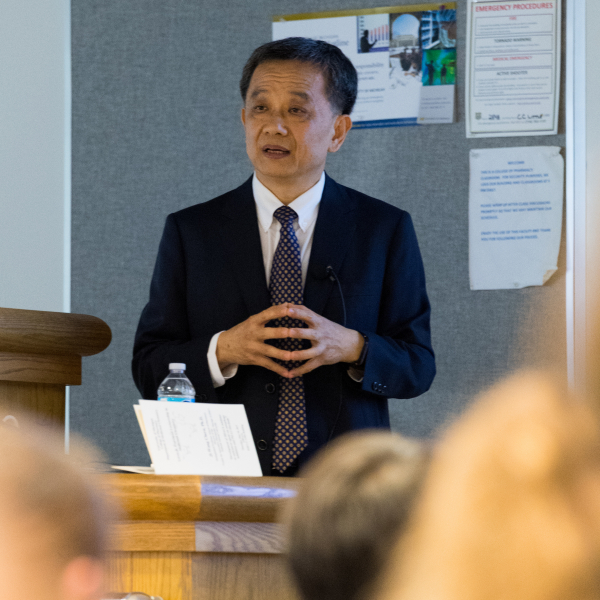Pharmacy Family’s Legacy of Excellence

Prof. Ji-Wang Chern returned to the College this spring to deliver the annual Leroy B. Townsend Lectureship in Medicinal Chemistry, which honors Prof. Townsend’s long and distinguished career. The lecture was also a family reunion. Prof. Chern’s son, Ting-Rong Chern, is a fifth-year medicinal chemistry PhD candidate.
Prof. Chern earned his PhD in Medicinal Chemistry in 1985 from the University of Michigan College of Pharmacy, where he studied under the guidance of Prof. Townsend. Prof. Chern has enjoyed a successful career in academia, including a chair position in and Dean of the School of Pharmacy at National Taiwan University (NTU) and NTU Dean for Research and Development from 2005-2012. Currently, he is a Distinguished Professor and the Director of the Center for Innovative Therapeutic Therapy at NTU.
Prof. Chern’s research focuses on design and synthesis of a variety of heterocycles as new anticancer, antiviral, and anti-neurodegenerative agents. He is author or co-author of 145 scientific papers, holds 14 patents, and is active in transferring technology developed from his laboratories. He has dedicated his life’s work to advancing human health, as well as creating a path for those who follow. Prof. Chern co-founded the Asian Association of Schools of Pharmacy and is a member of the Taiwanese Ministry of Science and Technology and the Ministry of Economic Affairs. In recognition of his distinguished career, Prof. Chern was elected a fellow of the American Association for the Advancement of Science in 2001.
 Following in his father’s footsteps, Ting-Rong Chern also hopes to make a lasting impact on the field. “I am working in the lab of Prof. Shaomeng Wang. One of the research interests of our lab involves the development of novel drugs to treat leukemias,” explains Ting-Rong. “Hypermethylation of the histone H3K4 is highly correlated with expression of leukemia stem cell maintenance genes. Studies also showed that a methyltransferase called MLL1 is required for MLL-AF9 induced leukemogenesis. However, it remains unclear if the MLL1 methyltransferase, that catalyzes the methylation of H3K4, is directly responsible for the disease. We want to address this fundamental biological question by probing the role of MLL1 methyltransferase in leukemogenesis using MLL1 selective inhibitors and genetic knockout /knockdown approaches. To date, there have been no reports of MLL1 selective inhibitors in the literature. My current research focuses on developing selective inhibitors targeting MLL1. The inhibitors developed in this project will enable studies that will provide a new perspective in this field. We also envision a possible therapeutic application for these MLL1 inhibitors in mixed-lineage type leukemia.”
Following in his father’s footsteps, Ting-Rong Chern also hopes to make a lasting impact on the field. “I am working in the lab of Prof. Shaomeng Wang. One of the research interests of our lab involves the development of novel drugs to treat leukemias,” explains Ting-Rong. “Hypermethylation of the histone H3K4 is highly correlated with expression of leukemia stem cell maintenance genes. Studies also showed that a methyltransferase called MLL1 is required for MLL-AF9 induced leukemogenesis. However, it remains unclear if the MLL1 methyltransferase, that catalyzes the methylation of H3K4, is directly responsible for the disease. We want to address this fundamental biological question by probing the role of MLL1 methyltransferase in leukemogenesis using MLL1 selective inhibitors and genetic knockout /knockdown approaches. To date, there have been no reports of MLL1 selective inhibitors in the literature. My current research focuses on developing selective inhibitors targeting MLL1. The inhibitors developed in this project will enable studies that will provide a new perspective in this field. We also envision a possible therapeutic application for these MLL1 inhibitors in mixed-lineage type leukemia.”
“After graduation, I would like to continue my research journey via a postdoctoral fellowship and seek the opportunity to work in academia or industry in the drug discovery related area in the United States,” continues Ting-Rong. “My long-term goal is to share the cutting-edge knowledge I've gained at U-M with my home country, Taiwan. My ultimate aspiration is to develop drugs that directly benefit human health.”
The fine reputation enjoyed by the College is in large part a reflection of the esteem and accomplishments of our alumni and students.



